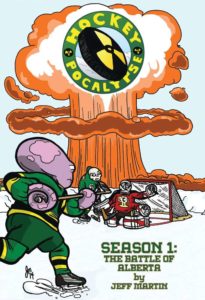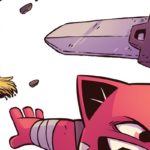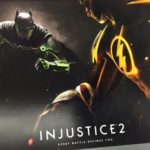
Red Coats, History, and Zog – Interview with Jeff Martin
by Josh Rose
One of Renegade Arts Entertainment’s creators is Jeff Martin, a Canadian creator who lives in Edmonton, Alberta. He’s the writer and artist of graphic novels such as Where is Zog?, Redcoats-ish, Redcoats-ish 2, Hockeypocalypse, and a new webcomic Hell Inc. Rogues Portal had the opportunity to talk to Jeff Martin about his work, and what makes Canadian history great story telling material.
RP: What led you to create a comic about early Canadian History?
 JM (Jeff Martin): I took a lot of Canadian history courses when I was at the University of Alberta (I think I took all of the ones that were available at the time), which is what put the idea in my head in the first place. In particular, I took a course on Canadian military history, which was the first time I’d learned about the War of 1812 in any real detail. Broadly speaking, early Canadian history tends not to get a lot of focus, because we live next to America, and their media overwhelms ours. Most of us probably know more about early American history than we do about our own country, and I wanted to make an effort to change that.
JM (Jeff Martin): I took a lot of Canadian history courses when I was at the University of Alberta (I think I took all of the ones that were available at the time), which is what put the idea in my head in the first place. In particular, I took a course on Canadian military history, which was the first time I’d learned about the War of 1812 in any real detail. Broadly speaking, early Canadian history tends not to get a lot of focus, because we live next to America, and their media overwhelms ours. Most of us probably know more about early American history than we do about our own country, and I wanted to make an effort to change that.RP: What would you say to people who think Canadian history is boring? What do you think makes it so interesting?
JM: Canadian history is like any other history: it’s a story. Whether or not a story is interesting relies heavily on how it’s told. Decades of dry social studies classes in school that focus on names, dates, and events are like reading a very long Wikipedia summary of a novel instead of the novel itself. The other factor is that Canada is a country that leans on its peacefulness and reasonability, and you see that in the origin story of our country in contrast to America’s. America fights a bloody war of rebellion to gain independence from Britain, and Canada just asks for it. That carries over into how the national narratives of those countries are presented. America’s stories are full of blood and guts, action, and passionate conflict. Canada’s stories are presented as “there was a problem, and then we tried to solve it.” When you actually dig into those stories, though, there’s so much there that could fascinate a large audience, but doesn’t because of how it’s presented. You know what the easiest way to get somebody interested in a War of 1812 story is? “Hey, wanna hear about how Canada burned down the White House?” Boom. Done.
RP: Why a comic about the War of 1812 instead of the Seven Years’ War?
JM: The most prominent reason was that Renegade Arts Entertainment had already published a War of 1812 comic, and wanted a spinoff series that they could post as a webcomic on their site to drive eyeballs to The Loxley’s and The War of 1812. The fact that I already had a rough script about the War of 1812 in my drafts folder already helped make that decision a no-brainer. The other reason, which I didn’t think about until later when the Seven Years’ War was brought up in conversation with a reader, was that the War of 1812 is an early unifying event in Canadian history. The English and French Canadians worked together with each other and the indigenous peoples to repel an invasion from a common enemy. The Seven Years’ War is inherently about division; it’s a battle for dominance of a land that neither the French nor English really had a claim to, but came in and took. I think it’s an interesting story, and one worth telling, but I wanted my first foray into Canadian history to be something that would make people proud of being Canadian, while also highlighting some of the elements of Canadian history that get swept under the rug.
 RP: The way you do your panel layouts is more akin to that of a newspaper comics strip rather than a traditional comic book. Is there a particular reason you do it this way?
RP: The way you do your panel layouts is more akin to that of a newspaper comics strip rather than a traditional comic book. Is there a particular reason you do it this way?JM: The earliest comics that I read as a child were all newspaper comics, so I’ve always had an affinity for that format. I also really like it as a challenge to my technical skills, as laying out a strip requires different storytelling and page design techniques than the standard vertically-oriented page. In this particular case, I had been doing most of my work at the time in a strip format, because I really like how it looks on screens, and Alexander Finbow at Renegade agreed that it would make the comic stand out even more against The Loxley’s when it came time to release it as its own book.
RP: What is something you think people should know about the Canadian Indie comics scene and self-publishing?
JM: That it exists? That’s probably a good place to start. Most comics discourse still talks about comics published by Image as being “indie,” because they’re creator-owned. Creator-owned and indie are not the same thing, especially not when you get into marketing a book. There’s a frustrating loop where nobody wants to cover your books because it won’t get them clicks, but without coverage it’s way harder to build your profile among the audience who reads those sites and makes them want to click on articles about you. Canada’s geography makes it tough for there to really be a “scene” on the indies–everything is so spread out, that you really need to sink money into travel if you want to get the word out about your books at shows.
RP: What is your dream comic project?
 JM: Oh man, I have all kinds of projects I’d love to do. Like everyone, I have a handful of licenses I’d love to leave my mark on (WWE and Blood Bowl are currently at the top of my list), but most of my dream projects boil down to being able to tell the stories I want to tell and have them reach the widest audience possible. I’m drawing the fourth Hockeypocalypse volume right now, and I can’t wait for people to be able to read it. Every time I work on that series, I love it even more.
JM: Oh man, I have all kinds of projects I’d love to do. Like everyone, I have a handful of licenses I’d love to leave my mark on (WWE and Blood Bowl are currently at the top of my list), but most of my dream projects boil down to being able to tell the stories I want to tell and have them reach the widest audience possible. I’m drawing the fourth Hockeypocalypse volume right now, and I can’t wait for people to be able to read it. Every time I work on that series, I love it even more.RP: Any advice for folks looking to get into creating comics for the first time?
JM: Finish what you start. You can make that easier by starting out with short stories, so you only need to have a handful of pages done to finish the project. But either way, finish what you start. The point of telling stories is to be able to share them with others. You can’t do that if it’s not done. Perfect isn’t achievable. Done absolutely is.
RP: Everyone is wondering where Zog is, but I gotta ask: Who is Zog?
JM: Turns out Matt Groening beat me to the reveal: Zog is the king of Dreamland.
—
Thank you Jeff for taking the time to talk to us! Be sure to check out Jeff Martin’s books on his personal website and the other books over at Renegade Arts Entertainment.



